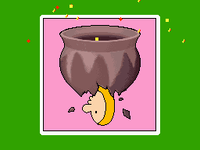WarioWare, Inc.: Mega Party Game$!
| WarioWare, Inc.: Mega Party Game$! | |||||||||||
|---|---|---|---|---|---|---|---|---|---|---|---|
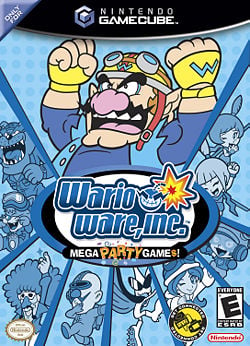 For alternate box art, see the game's gallery. | |||||||||||
| Developer | Nintendo R&D 1 Intelligent Systems | ||||||||||
| Publisher | Nintendo | ||||||||||
| Platform(s) | Nintendo GameCube | ||||||||||
| Release date | |||||||||||
| Language(s) | English French (France) German Spanish (Spain) Italian Japanese | ||||||||||
| Genre | Action, Party | ||||||||||
| Rating(s) |
| ||||||||||
| Mode(s) | Single player, Multiplayer | ||||||||||
| Format | Nintendo GameCube:
| ||||||||||
| Input | Nintendo GameCube:
| ||||||||||
| Serial code(s) | |||||||||||
WarioWare, Inc. Mega Party Game$! is a game for the Nintendo GameCube and the second installment of the WarioWare series following WarioWare, Inc.: Mega Microgame$! on the Game Boy Advance. It reuses all of the microgames from Mega Microgame$!, but Mega Party Game$! focuses on multiplayer in particular. It comes with eight special multiplayer modes for up to four players that all involve the known microgames in some way. While it includes a few new modes, the single-player mode is heavily reduced and does not feature the unlockable mini-games from the predecessor. Mega Party Game$! and the later release WarioWare: Snapped! are the only WarioWare games without plots and story-themed stages.
Microgame genres[edit]
- Wario - Intro
- Jimmy T. - Sports
- Dribble & Spitz - Sci-Fi
- Mona - Strange
- 9-Volt - Nintendo
- Orbulon - IQ
- Dr. Crygor - Reality
- Kat & Ana - Nature
- Wario - Anything Goes
Single player[edit]
Games[edit]
- Stage Clear - Clear the selections of microgame genres. Each genre is given to a different WarioWare character (see Microgame genres above). After a while, microgames will be played at higher speed and difficulty. The player has four hearts. When the player loses a microgame, they will lose a heart. When all hearts are gone, the game will end. When the player has beaten the last microgame, the Boss Stage, the stage is cleared and an extra heart will be awarded. When one stage is cleared, the next stage will be played until all stages are cleared. Clearing all stages unlocks "All Mixed Up." / In-game description: Beat all of the games in each genre! You can only clear a genre by defeating its boss! If you mess up, don't worry. You can always start over again! <If you clear all of the stages, you might get something good!!>
- All Mixed Up - All the microgames of the different stages are all mixed. Speed and difficulty will get higher when the player makes progress. The player has 4 hearts and it's possible to earn new hearts. When the player has won 30 games, "Time Attack" is unlocked in Games.
- Hard - All the microgames are at a high speed but the lowest difficulty. The player has 4 hearts and cannot earn new hearts.
- Thrilling - All the microgames are at the highest difficulty. The player has only one heart, so failing once ends the game.
- Time Attack - Play through 20, 40 or 60 games. When winning a game, speed will get higher. When losing a game, speed will get lower. The player must try to get the smallest time at the end of the microgame row.
- Master Mode - Play all the microgames in the game on Level 3, except the boss microgames. The player has infinite lives, and scores a point for every passed microgame.
- Character Intros - Information about the WarioWare characters can be found here.
- Movie Matters - View movies. These videos contain two music videos and all the others are stories.
- Staff Roll - View the game credits. The player can shoot on question marks to transform them into letters.
Album[edit]
In album mode, the player can play single microgames. They first need to select a genre of microgames before they can play a microgame. When a microgame is selected, the player can select if it will be played in Record or Practice mode. In Practice mode, the player can set up the speed of the microgames to practice them. In Record mode, the player tries to win the microgame as much as possible. When the player meets the point quota for a given microgame, they will be awarded a flower. When all the flowers of each microgame are won, "Master Mode" is unlocked in Games.
Multiplayer[edit]
It has been requested that this section be rewritten and expanded to include more information. Reason: Include more information on multiplayer minigames because it requires general cleanup
| Stage | Host | Description |
|---|---|---|
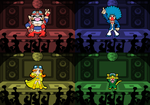 Survival Fever |
Jimmy T. | Survival Fever is a microgame versus mode where players play microgames that get increasingly faster, if the player fails a microgame, they lose part of their audience. If the whole audience is gone, the player loses. After a player loses, they are able to walk around the screen. The last remaining player wins. |
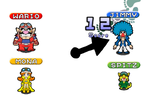 Outta My Way |
Wario | In Outta My Way, one player is playing microgames while the other players try to distract them and make them fail by moving around and striking poses by pressing |
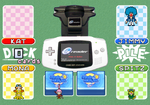 Card-e Cards |
9-Volt | Players have to pick up e-Reader cards with a screenshot of a microgame on from one of two decks, with these cards going on a pile on the left of the screen. At random, a card containing a Game Boy Advance with an e-Reader will be drawn. At this point, the drawer has to play the microgames on the microgame cards in the pile. If the player wins all the microgames, they win all the cards on the pile. If the player loses one microgame, they lose all the cards in the pile and all the cards that they have previously won. All those cards will go to a pile on the right of the screen. If a player has cards, background players could steal cards by pressing |
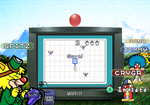 Balloon Bang |
Dr. Crygor | In Balloon Bang, one player plays microgames while other players repeatedly press |
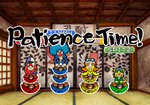 Wobbly Bobbly |
Kat & Ana | Wobbly Bobbly is a versus mode where players balance on tortoise shells. The players play a multiplayer minigame and the winner plays a microgame. Depending on whether or not they win or lose a shell is added to the player or the other player(s). The game ends when all but one player fall. |
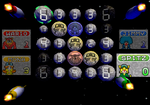 Milky Way Delirium |
Dribble & Spitz | The players have a square of asteroids with numbers on them. The number corresponds to the number of microgames that must be played to claim the asteroid. Complete the required number of microgames, and the asteroid is marked as belonging to the player that completed the games. If a player claims an asteroid that is in a vertical, horizontal, or diagonal line ending with another one of the player's asteroids, every asteroid in that line falls under the possession of the player as well. When all of the asteroids have been claimed, the player with the most asteroids has to fight a big robot, if the player beats the robot, they will win the game. If not, the others win. |
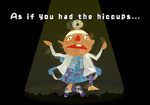 Listen to the Doctor! Listen to the Doctor!
|
Mona | In Listen To The Doctor!, players are in a doctor's office. One player goes in and does a microgame as well as to do something outside the game like confess something embarrassing. If the player completes both tasks the other players clap by repeatedly pressing |
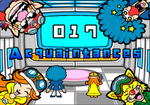 All For One |
Orbulon | This is the only multiplayer game where the other players help another player instead of battling with each other. The player's character shows a Game Boy Advance, and their goal to achieve the highest possible record. However, the screen's light fell out, so the other players have to help the player playing the microgames by controlling a spotlight. There are three chances. If all three batteries are gone, the game is over. |
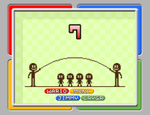 Jump Forever |
N/A | A jumping rope game. 2 to 4 players must jump over the jump rope at the same time. If one or more players touch the jump rope, the game is over. |
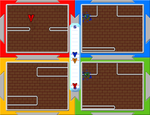 Paper Plane |
N/A | A paper airplane race between 2-4 players. If a player crashes against a wall, they will respawn, but lose time. The first one to reach the finish is the winner. |
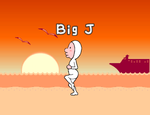 1 Controller Survival |
N/A | Up to 16 players can play microgames with only one GameCube Controller. If a player fails a microgame, they are out. Last one remaining is the winner. |
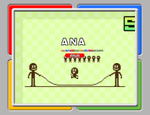 1 Controller Jump Forever |
N/A | Same as Jump Forever, but up to 16 players can play with only one GameCube Controller. Each player takes turns jumping on the jump rope. If one of the players hit the rope, the game ends. |
Microgames[edit]
- Main article: List of WarioWare, Inc.: Mega Microgame$! microgames
Like WarioWare, Inc.: Mega Microgame$!, all microgame sets except for the Intro Games set feature 25 microgames each, making up a total of 213 microgames.
Development[edit]
After seeing the success of WarioWare, Inc.: Mega Microgame$!, Satoru Iwata requested the development team to port the game to the Nintendo GameCube "as soon as possible."[6] To help with development, Goro Abe enlisted the help of Taku Sugioka, a talented programmer he knew at Intelligent Systems. The game was developed in six months.[7]
Reception[edit]
The game received generally favorable reviews from critics. IGN gave the game a 7.5 out of 10 stating it as a "fun multiplayer game that suffers from a bad case of deja joue". GameFAQs gave the game a 7.5 out of 10. Metacritic gave the game a 76 out of 100 based on 46 reviews. Eurogamer's Kristan Reed gave the game a 7 out of 10 saying that "You've got to fight! For your right! To paaaaaaaaaaarty!"
| Reviews | |||
|---|---|---|---|
| Release | Reviewer, Publication | Score | Comment |
| Nintendo GameCube | Peer Schneider, IGN |
7.5/10 | The recycling of mini-games takes its toll on the multiplayer modes as well. With only a handful new challenges, the element of surprise is severely lessened for returning players. Buy it only if you play a lot of multiplayer games at your house. Or rent it for your next party and spend the rest of your cash on a giant keg. |
| Nintendo GameCube | Bryn Williams, Gamespy |
4/5 | I highly recommend GameCube owners check out WarioWare. Providing you've got a few friends who share similar gaming sensibilities, WarioWare, Inc.: Mega Party Game$ will make an excellent addition to your library. Even if you don't go for multiplayer gaming that much, I think you'd be hard pushed not to fall in love with the anarchical madness on offer here. Just don't expect a revelation where the single-player game is concerned -- the GBA has that aspect nailed better than any other attempt ever could. |
| Nintendo GameCube | Kristan Reed, Eurogamer |
7/10 | If the answer to all our problems is to simply party your way through them, then consider Wario Ware Inc as your gaming ally. It's not perfect, and we hope Nintendo takes the concept further, but it's still well worth checking out even for a few hours' worth of hilarity. |
| Aggregators | |||
| Compiler | Platform / Score | ||
| Metacritic | 76 | ||
| GameRankings | 76.27% | ||
Staff[edit]
- Main article: List of WarioWare, Inc.: Mega Party Game$! staff
The game was a coproduction between Nintendo R&D 1 and Intelligent Systems, a collaboration that would continue for most subsequent WarioWare games. A large portion of Mega Party Game$!'s staff had previously worked on WarioWare, Inc.: Mega Microgame$! Programmer Goro Abe was promoted to Director position, a role that he would continue to assume for most WarioWare sequels.
The game was one of Nintendo R&D 1's last releases before its dissolution.
Gallery[edit]
- For this subject's image gallery, see Gallery:WarioWare, Inc.: Mega Party Game$!
Media[edit]
- For a complete list of media for this subject, see List of WarioWare, Inc.: Mega Party Game$! media. For this subject's sound test, see WarioWare, Inc.: Mega Party Game$! sound test.
| File info 0:30 |
| File info 0:30 |
| File info 0:30 |
| File info 0:00 |
| File info 0:00 |
References to other games[edit]
- Wario Land 3: One of the intro movies features Bat Wario.
References in later games[edit]
- WarioWare: Touched!: In Quite Puzzled, the animation for the pot puzzle shows the yellow player character from 1 Controller Survival.
- WarioWare Gold: Stealth Turtles reappears as an unlockable souvenir record.
- WarioWare: Move It!: Listen to the Doctor! returns as a multiplayer mode.
Names in other languages[edit]
| Language | Name | Meaning | Notes |
|---|---|---|---|
| Japanese | あつまれ!!メイド イン ワリオ[?] Atsumare!! Meido in Wario |
Gather!! Made in Wario |
Notes[edit]
- All of the hosted multiplayer games follow the host's theme:
- Survival Fever (Sports) features dancing, which fits the definition of a sport.
- In Outta My Way (Intro Games/Anything Goes), the shadowy shape that appears between turns morphs into Wario's nose and mustache before revealing the boombox. It also briefly appears in this shape when a turn ends.
- Card-e Cards (Nintendo) features a Nintendo product, specifically the e-Reader.
- The setting for Balloon Bang (Reality) uses photorealistic graphics.
- Wobbly Bobbly (Nature) features animals, specifically turtles, which are stated to be Kat's favorite animal.
- Milky Way Delirium (Sci-Fi) features space, rockets, asteroids, lasers, and a giant robot.
- Listen to the Doctor! (Strange) features a doctor's appointment.
- All For One (IQ) forces players to think by making them work together and figure out where to put their flashlights.
- This is one of only two Mario-related games for the Nintendo GameCube to lack progressive scan support, the other being NBA Street V3.
References[edit]
- ^ あつまれ!!メイド イン ワリオ. Nintendo Co., Ltd. (Japanese). Retrieved May 18, 2018.
- ^ Super Smash Bros. Brawl Chronicle
- ^ News from Nintendo. Nintendo of Australia (Australian English). Archived August 31, 2004, 07:38:29 UTC from the original via Wayback Machine. Retrieved January 23, 2025.
- ^ WarioWare, Inc.: Mega Party Game$ | Nintendo GameCube | Games | Nintendo UK. Nintendo UK (British English). Retrieved January 23, 2025. (Archived January 24, 2025, 02:27:22 UTC via Wayback Machine.)
- ^ WarioWare, Inc.: Mega Party Game$. Nintendo of South Africa (English). Retrieved June 3, 2024. (Archived June 4, 2024, 00:11:53 UTC via Wayback Machine.)
- ^ Iwata Asks: WarioWare: Snapped
- ^ Iwata Asks: WarioWare; D.I.Y
External links[edit]
| Nintendo GameCube games | |
|---|---|
| Super Mario franchise | Luigi's Mansion (2001) • Super Mario Sunshine (2002) • Mario Party 4 (2002) • Mario Golf: Toadstool Tour (2003) • Mario Kart: Double Dash!! (2003) • Mario Party 5 (2003) • Paper Mario: The Thousand-Year Door (2004) • Mario Power Tennis (2004) • Mario Party 6 (2004) • Dance Dance Revolution: Mario Mix (2005) • Mario Superstar Baseball (2005) • Mario Party 7 (2005) • Super Mario Strikers (2005) |
| Donkey Kong franchise | Donkey Konga (2003) • Donkey Konga 2 (2004) • Donkey Kong Jungle Beat (2004) • Donkey Konga 3 JP (2005) |
| Wario franchise | Wario World (2003) • WarioWare, Inc.: Mega Party Game$! (2003) |
| Other | Super Mario 128 (2000, demo) • Super Smash Bros. Melee (2001) • Nintendo Puzzle Collection (2003) • NBA Street V3 (2005) • SSX on Tour (Nintendo Village) (2005) • Donkey Kong Racing (cancelled) • Diddy Kong Racing Adventure (cancelled) |




